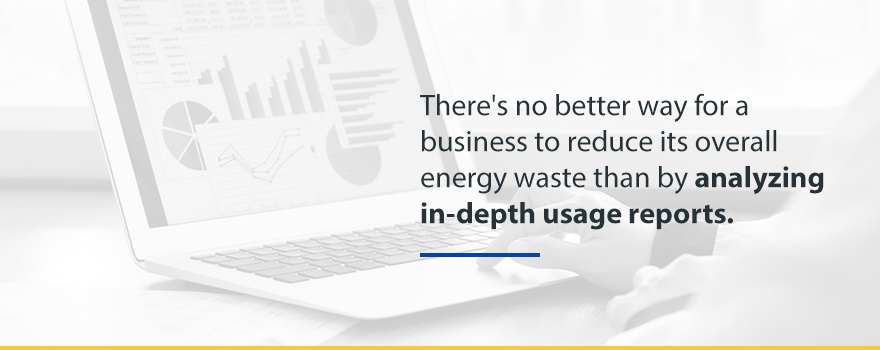Energy efficiency strategies bring quantifiable business results through the following measures. Here are a few to consider.

Businesses can accidentally waste energy for many reasons:
Not setting or following an HVAC schedule, such as leaving the air conditioning on when buildings are going to be unoccupied for long periods.
Generating large peak loads by turning on all systems at once, typically in the morning.
Mismanaging delivery schedules.
Not regularly testing or replacing equipment.
Neglecting to analyze data from their building management systems.
Poorly placed thermostats.
Miscalculating machine, equipment or vehicle fuel capacities and consumption.

There’s no better way for a business to reduce its overall energy waste than by analyzing in-depth usage reports. Consumption tracking and data-rich usage reports provide the foundation for improved load and energy demand forecasting. Without these analytics, it can feel like you’re taking one step forward but two steps back to change your energy footprint.
Improved usage reports bring energy procurement managers many benefits:
For the CFO/COO: Usage reports provide the keys to timely, accurate and well-forecasted financial progress to showcase to other C-suite members, teams and stakeholders.
For the Small Business Owner: Usage reports generated from your commercial energy retailer assure you’re getting the best, most competitive prices for the energy loads you need compared to an old utility contract.
For the Fleet Manager: Better usage reports and load forecasting eliminate fueling fraud and excessive fuel purchasing by tracking in-depth job site and vehicle usage metrics.
For the Facility Manager: Insights from energy reports address many of the facility-driven fuel wastes named earlier. Managers can use reports to stagger equipment start-ups and map out better load demand schedules. Better scheduling maximizes fuel on-hand, reducing equipment downtimes, facility complaints, budget oversights or misappropriated fuel orders.
For the Purchasing/Supply Chain Manager: Usage reports point toward airtight delivery schedules and better running machinery, meaning fewer supply chain disruptions, fewer equipment downtimes and fewer employees without the tools they need to get their jobs done.
Commercial energy procurement can mean one energy partner serving as the single point of contact for all your energy needs. Anyone in management knows the pain of having too many cooks in the kitchen. Reducing vendor complexity can have a positive impact on your business — eliminating chokepoints, simplifying workflows and allowing people to more easily complete their work.
Here are a few ways that having fewer vendors translates into fewer headaches for specific business roles:
For the CFO/COO: Minimized vendor touch-points allows direct access to expert advice plus market and compliance insight for you to steer your business in the right, risk-mitigating direction.
For the Small Business Owner: Simplifying vendor relations saves time and energy, as business owners no longer need to sift through and manage dozens of contracts, orders and invoices regularly.
For the Fleet Manager: An energy procurement company can send one bill for all vehicles and equipment across all routes and work sites.
For the Facility Manager: Commercial retailers provide a set group of contacts you can reach out to anytime to review fuel deliveries, demand loads, billings and emergency facility support.
For the Purchasing/Supply Chain Manager: Fewer vendors often translates into far fewer invoices, accessed in one or a handful of places, and organized in one digital records-management system.
Energy cost-savings can unlock new cash flows. These cash flows can then be used toward optimizing equipment, building and vehicle operations to match overall business-resource planning. The results? A better bottom line in the short and long term.
A better bottom line is music to the ears of any energy procurement manager:
For the CFO/COO: Increased cost-savings means lower organization-wide overhead costs — one of your title’s key domains.
For the Small Business Owner: Enhanced cash flows and lower overhead costs combine to give you the flexibility to grow your business the way you’ve always imagined.
For the Fleet Manager: Increased cost-savings can allow for maximized fleet functions by reducing fuel-related downtimes and keeping deliveries on time.
For the Facility Manager: More flexible cash flows can have you running your building like a well-oiled machine without the fear of budget shortages. Predictable billing and other perks like automatic fuel refills, set delivery schedules and 24-hour emergency fuel replenishment all come without fee or billing surprises.
For the Purchasing/Supply Chain Manager: Cost-savings can lead to better resource planning, which streamlines many of your daily responsibilities, including invoice approvals and billing-cycle management.
Perhaps most importantly, effective energy procurement strategies can help you focus on what you do best. Energy retailer partnerships should be built with companies who are trustworthy, deeply knowledgeable and aligned with your company’s interests. You’re then free to focus on the strategic tasks and responsibilities that comprise the true nature of your position.
Effective energy procurement lets managers return to their most pressing work:
For the CFO/COO: With people, processes and equipment better organized under an on-budget energy plan, you can attend to high-level strategic initiatives.
For the Small Business Owner: Proactively engage with the market based on intelligence from the experts at the energy retailer rather than reacting to billing surprises or spending your limited time monitoring the market.
For the Fleet Manager: Focus on optimizing your operations rather than worrying about whether your fuel delivery will show up on time.
For the Facility Manager: Enhance equipment and facilities to run like clockwork — and have the resources and budget wiggle room in place if surprises do strike.
For the Purchasing/Supply Chain Manager: Simplify your daily, weekly, monthly and yearly management of the basic purchase and procurement orders that are the backbone of business operations.
Get a personalized quote today from one of Shipley Energy’s Commercial Solutions team.
Chapter 5: Top Energy Procurement Myths and Misconceptions
Chapter 7: The Top Energy Risk Management Questions to Ask Your Energy Provider
